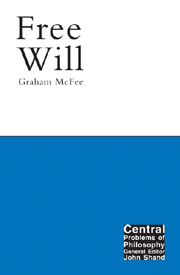Book contents
- Frontmatter
- Contents
- Preface and acknowledgements
- 1 Free will: the issue
- 2 Determinism: exposition
- 3 Determinism: qualifications and clarifications
- 4 Libertarianism: two varieties
- 5 Compatibilism I: the “utilitarian” position
- 6 Compatibilism II: the two-language view
- 7 The irrelevance of determinism
- 8 The very idea of causal necessity
- 9 Conclusions and reflections on philosophical method
- Appendix: chaos theory and determinism
- Notes
- A guide to further reading
- Bibliography
- Index
4 - Libertarianism: two varieties
- Frontmatter
- Contents
- Preface and acknowledgements
- 1 Free will: the issue
- 2 Determinism: exposition
- 3 Determinism: qualifications and clarifications
- 4 Libertarianism: two varieties
- 5 Compatibilism I: the “utilitarian” position
- 6 Compatibilism II: the two-language view
- 7 The irrelevance of determinism
- 8 The very idea of causal necessity
- 9 Conclusions and reflections on philosophical method
- Appendix: chaos theory and determinism
- Notes
- A guide to further reading
- Bibliography
- Index
Summary
Introduction
As noted towards the end of Chapter 2 and again in Chapter 3, the conclusion of any argument can be contested either by disputing the truth of some or all of the argument's premises or by denying that the conclusion follows from those premises. In that vein, this chapter will consider opposition to determinism based on denying the truth of the first premise of our determinist argument (Chapter 2, p. 21): that every event has a cause. (Later chapters will consider other premises.) Traditionally, those who deny the truth of the premise that every event has a cause are called “libertarians”: although this name may not be completely happy, I will use it here to pick up that philosophical tradition.
Does libertarianism provide a satisfactory answer to the challenge of the determinist argument? If not, does it nevertheless shed light on what free will defenders must acknowledge? And a satisfactory answer is of course one that has an “exact fit” with our examples of unfreedom or constraint (such as key cases 2 & 6) and with our examples of free action, such as walking across the room [key case 1], drinking a glass of water, and so on: actions that will be free if any are.
Two ways of denying that every event has a cause identify two versions of libertarianism. First, one might urge that some events were uncaused so it was not true that every event has a cause, an option to be considered in the next section.
- Type
- Chapter
- Information
- Free Will , pp. 53 - 68Publisher: Acumen PublishingPrint publication year: 2000

